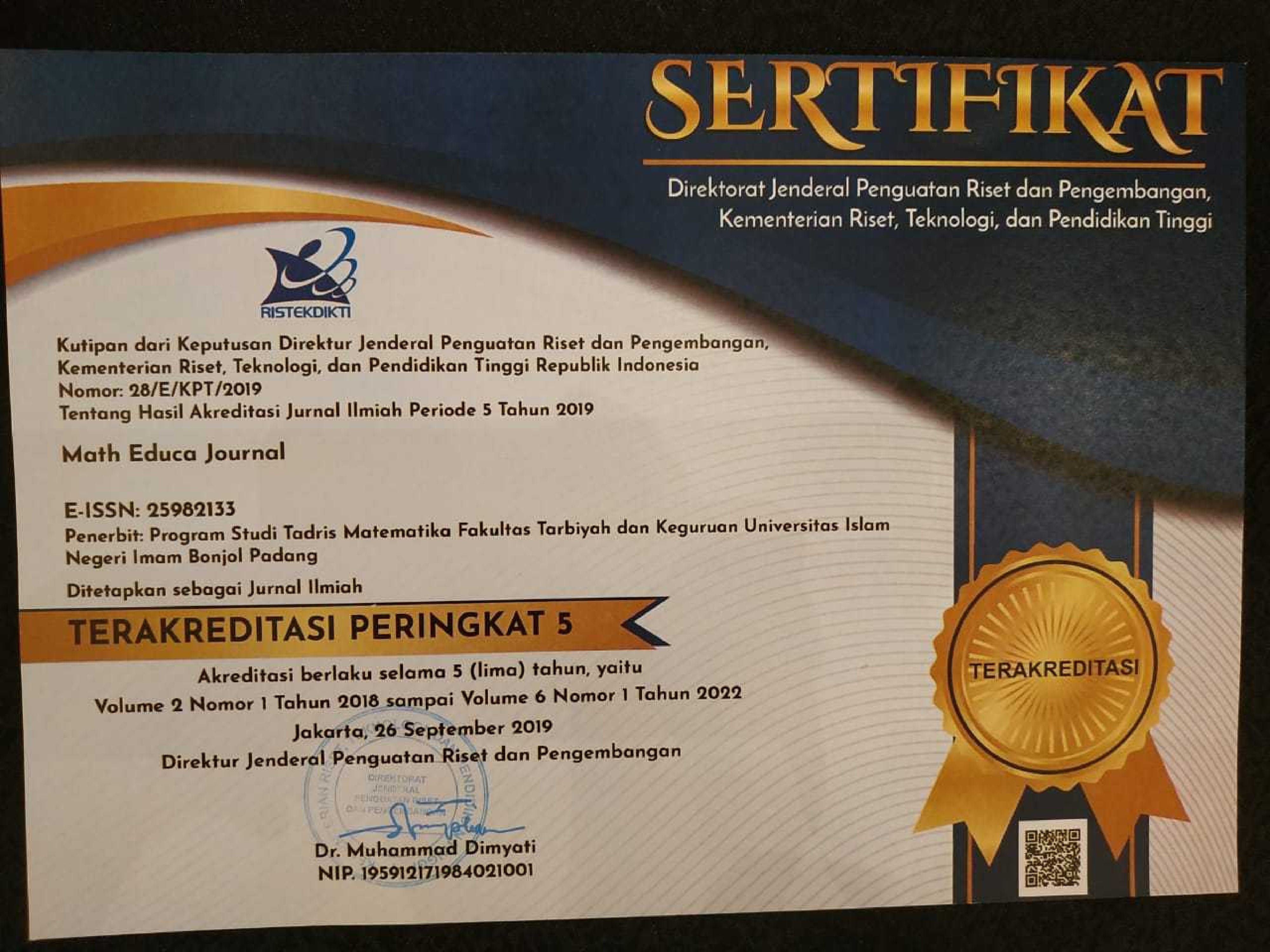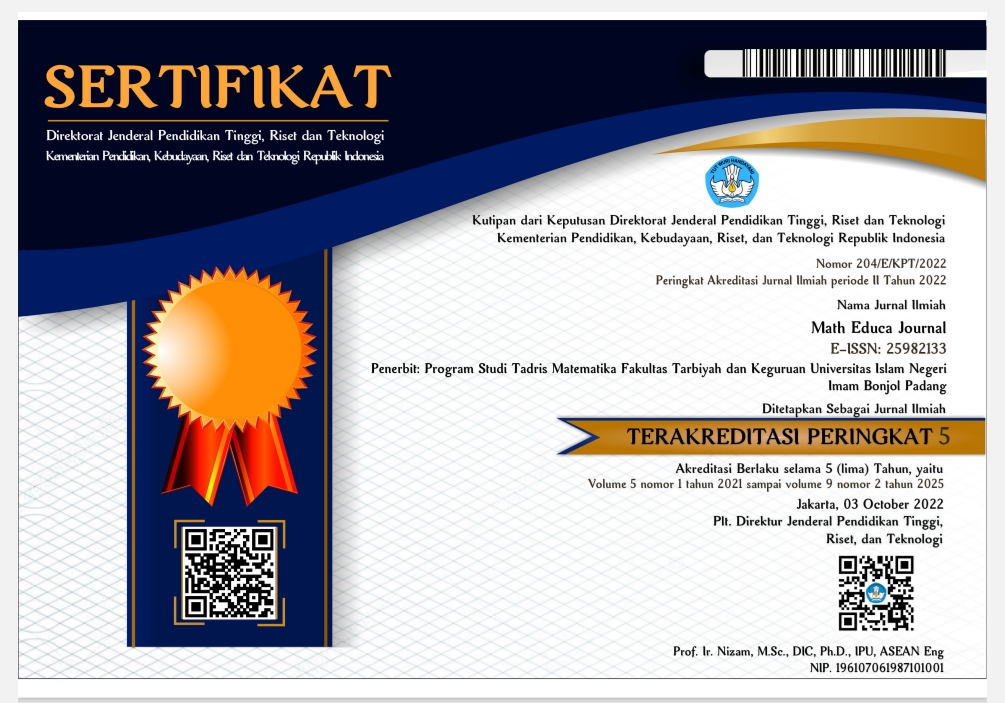ETNOMATEMATIKA PADA ALAT MUSIK GAMELAN JAWA
Abstract
This study aims to determine the mathematical concepts applied to Javanese gamelan musical instruments. The type of research used in this research is qualitative research with an ethnographic approach, namely describing Javanese gamelan musical instruments as a medium for learning Mathematics. Data obtained through interviews, observation, and documentation. The instrument in this study consisted of the main instrument, namely the researcher himself and auxiliary instruments in the form of interview guidelines, observation sheets, and documentation tools. The data validity technique used is method triangulation and source triangulation. The results of this study indicate that there are mathematical concepts that are applied to Javanese gamelan musical instruments such as one-dimensional geometry, namely the concept of lines, parallel lines and right angles, two-dimensional geometry, namely square, rectangle, circle, trapezoid, and triangle. three in the form of a tube, a sphere, and a truncated cone. With the existence of mathematical concepts in Javanese gamelan musical instruments, it is very possible for mathematics learning media to be designed using Javanese gamelan ethnomathematics so that mathematics contributes to the preservation of the nation's culture.
Keywords
Full Text:
PDFReferences
Bishop, A. (1988b). Mathematical enculturation: A cultural perspective on mathematics education. Boston, MA: Kluwer Academic Publishers.
Dowling, P. (1998). The sociology of mathematics education: Mathematical myths/pedagogic texts. Bristol, PA: Falmer Press.
Edy Tandililing. (2013). Pengembangan Pembelajaran Matematika Sekolah Dengan Pendekatan Etnomatematika Berbasis Budaya Lokal Sebagai Upaya Untuk Meningkatkan Kualitas Pembelajaran Matematika Di Sekolah. Seminar Nasional Matematika dan Pendidikan Matematika FMIPA UNY.
Gerdes, P. (1996). Ethnomathematics and mathematics education. In J. Bishop et al. (Eds.), International Handbook of Mathematics Education, pp. 909–943. New York: SpringerVerlag.
Maure, O. P., & Jenahut, K. S. (2021). Pengaruh Model Pembelajaran Probing-Prompting Yang Berbasis Etnomatematika Terhadap Prestasi Belajar Matematika Siswa. Math Educa: Jurnal Matematika dan Pendiidkan matematika, 5(1), 43.
Moleong, L. J. Moleong. (2011). “Metodologi Penelitian Kualitatif”, Bandung: PT. Remaja Rosdakarya.
Osada, S. S. (2019). Kajian Etnomatematika terhadap Musik Liturgi Inkulturatif Jawa dengan Laras Pelog dan Implementasinya dalam Pembelajaran Matematika di Sekolah (Doctoral dissertation, Tesis. Magister Pendidikan Matematika Universitas Sanata Dharma. Yogyakarta).
Purwadi dan Widayat Afendy. (2006). “Seni Karawita Jawa”, Jogjakarta: Hanan Pustaka.
Putri, L. P. (2017). Eksplorasi Etnomatematika Kesenian Rebana Sebagai Sumber Belajar Matematika Pada Jenjang MI. Jurnal Pendidikan Dasar, Vol IV.
Rudyanto, H. E., HS, A. K., & Pratiwi, D. (2019). Etnomatematika Budaya Jawa: Inovasi Pembelajaran Matematika Di Sekolah Dasar. Jurnal Bidang Pendidikan Dasar (JBPD), Vol. 3 No.2.
Siswanto.2017. “Tuntunan Karawitan 1”, Yogyakarta: Pusat Musik Liturgi
Siswanto.2017. “Tuntunan Karawitan 2”, Yogyakarta: Pusat Musik Liturgi.
Susanty, P.I., Muhammad, Z., & Kharisudin, I. (2019). Eksplorasi Etnomatematika Alat Musik Gong Waning Masyarakat Sikka. Seminar Nasional Pascasarjana UNNES.
Wahyuni, A., Aji, A.,& Sani, B. (2013). Peran Etnomatematika dalam Membangun Karakter Bangsa. Disajikan dalam seminar nasional matematika dan pendidikan matematika dengan tema “Penguatan Peran Matematika dan Pendidikan Matematika untuk Indonesia yang Lebih Baik”. Prosding; Jurusan Pendidikan Matematika FMIPA UNY.
Refbacks
- There are currently no refbacks.

This work is licensed under a Creative Commons Attribution-NonCommercial-ShareAlike 4.0 International License.
The Journal Space of the Mathematics Education Department
Faculty of Education and Teacher Training
State Islamic University of Imam Bonjol Padang
Email: mej.uinibpadang@gmail.com

Math Educa Journal is licensed under a Lisensi Creative Commons Atribusi-NonKomersial 4.0 Internasional.
Based on a work at https://ejournal.uinib.ac.id/jurnal/index.php/matheduca.
All rights reserved p-ISSN: 2580-6726 | e-ISSN: 2598-2133




